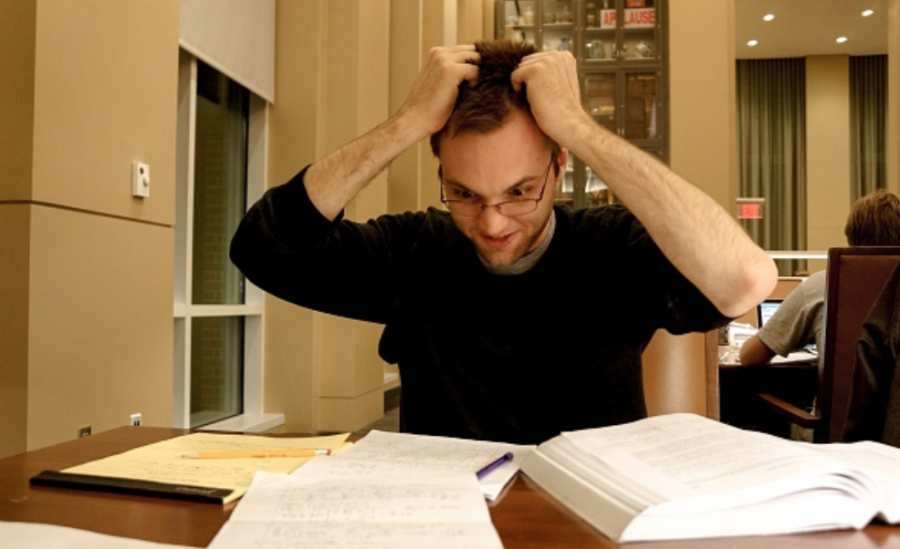Ways to manage stress before finals
As the Fall classes start heading into the final stretch, stress and burnout for many students can easily happen. From studying long nights or having major assignments due, things can pile-up causing students to stress about the end of the school year rather than finishing strong.
Everyone will stress about school and life, but people must understand that stress is okay and normal and that we take care of ourselves to improve our lives and mental health. Stress is something because most people deal with; it may not often be fully discussed.
As everyone stresses, did you know there are many symptoms of stress? According to the Mayo Clinic, there are three different aspects stress can impact you, such as your body, mood and behavior.
The effects on your body can be something as simple as a headache to trouble sleeping, while your mood can cause depression, anxiety, feeling overwhelmed and more. Finally, having social withdrawal, eating habits change, misuse of drugs or alcohol, tobacco use, angry outbursts and exercising less can be attributed to behavior changes caused by stress.
As many people will spend long nights doing homework and studying, sleep can affect a student’s ability to perform well in school. “Students who obtained more sleep (long sleepers, ≥9 hours) had higher GPAs than short sleepers (≤6 hours): GPAs were 3.24 vs. 2.74 on average, respectively,” according to the National Center for Biotechnology Information.
While many people want to sleep for long periods of time, it may be difficult with students working, causing them to stay up late and possibly having classes early in the morning.
For students, they may have anxiety caused by the stress but difficulty distinguishing the differences. When many students work on important assignments, it’s not uncommon to feel anxiety as every point matters. It’s, however, important to know what symptoms of anxiety are and how to manage it.
Symptoms of anxiety are difficulty controlling worrying, a sense of impending danger or doom, increase heart rate, rapid breathing and more.
While understanding that people are struggling mentally with school and any of the symptoms above is important, knowing how to cope greatly improves mental health, quality of life and academic success.
According to the CDC, for people to cope with the stress, they must
- Eat healthily and have balanced diets.
- Exercise regularly.
- To get enough sleep, it recommends that adults get between 7-9 hours of sleep.
- Take a break when you feel stressed out.
- Talk about the issue.
- Stay away from alcohol and drugs.
- Understand when you need help and to see a professional.
Every college student seems to value sleep. Sleep is important as it allows us to rest and perform at our maximum potential to succeed. While students will try to stay up well into the night and sometimes morning, it becomes more detrimental to students’ wellbeing.
To combat this University of Georgia health center recommends that people stay on a consistent sleep schedule and routine even on the weekends, not to eat 2-3 hours before your regular bedtime, to avoid caffeinated drinks 3-4 hours before your bedtime also and to work out regularly but finish the workout two hours before you go to bed.
It can seem like a lot to do everything at once, but a little change can help greatly. First, when starting the day, instead of eating a bowl of sugary cereal or not even eating at all, try eating oatmeal, fruit, cook eggs or even making a drink with fruit.
If you are trying to spare a few minutes getting sleep, then maybe preparing meals not just for the morning but also for lunch is the best way to go.
As the days go on and seem to overlap, it can be difficult to manage time between so many classes to find time to study, homework, time with friends and time for reflection and self-care.
It’s important to make a schedule, whether in the use of a large calendar, day planner or even just making notes of objectives you want to complete during a given day or week. This will help you know everything that you need to do and possibly help you realize it is doing just one step at a time.
When going to take a test, it’s normal to be nervous, but how nervous you are can be determined by how well you study. There are many ways to study. Some are more effective than others, as everyone thinks differently.
According to the University of St. Augustine for health science, simple ways to improve studying are to stick with an environment when feeling the pressure, change the environment such as a new coffee shop or library, eat healthy snacks, eliminate distractions and listen to relaxing music.
Some different study strategies, according to the University of St. Augustine, include:
- Color-coded notes
- Studying before bed
- Mind mapping
- Space review
- Retrieval practice
While stress can be hard to deal with, its underlining effects can be just as harmful, but if people take a moment to reflect and understand how important mental health is, it will benefit them and everyone around them.

Andrew is a journalism major. This is his second year with The Chaparral, and he covers sports. Andrew's favorite sports include golf, football and motorsports....






